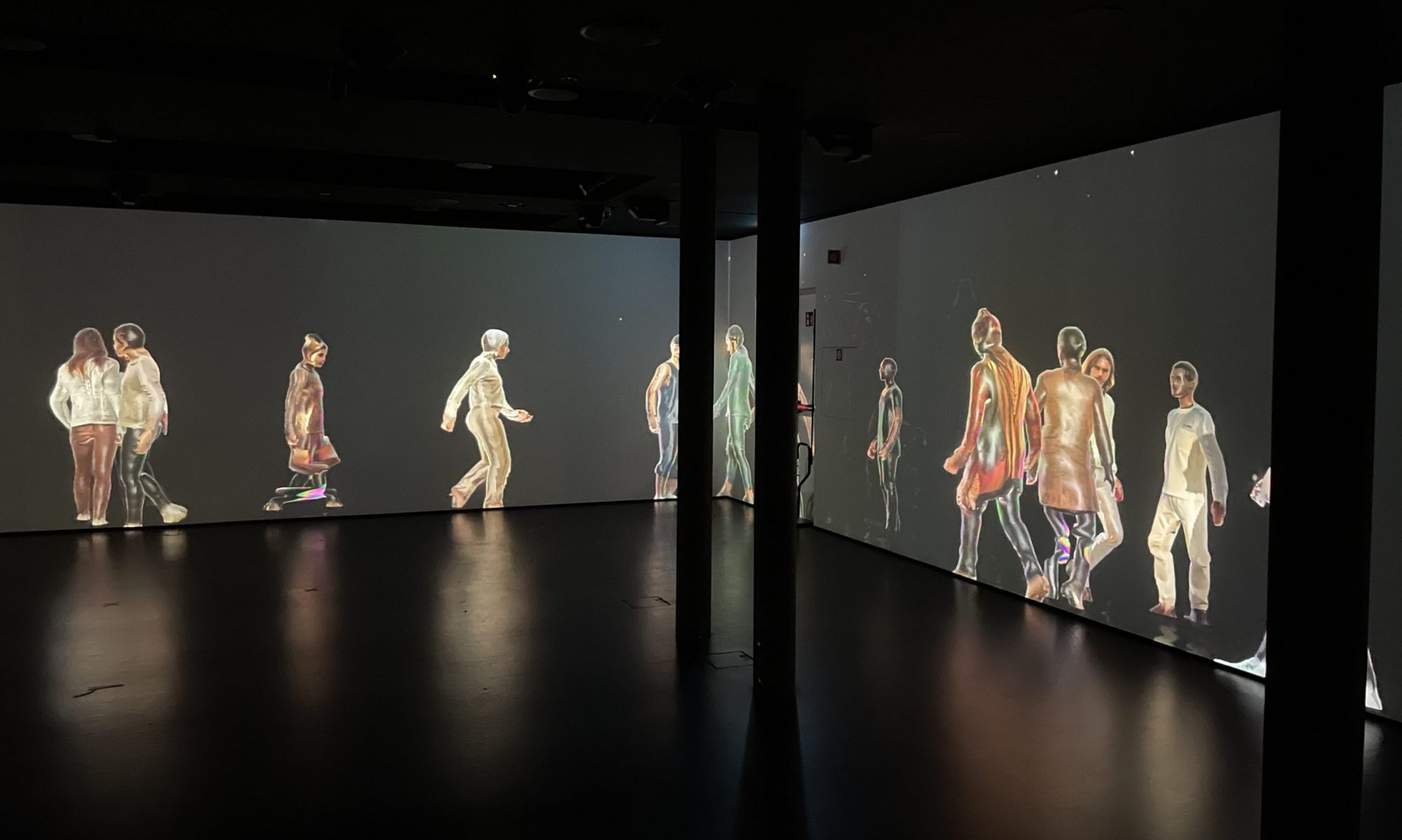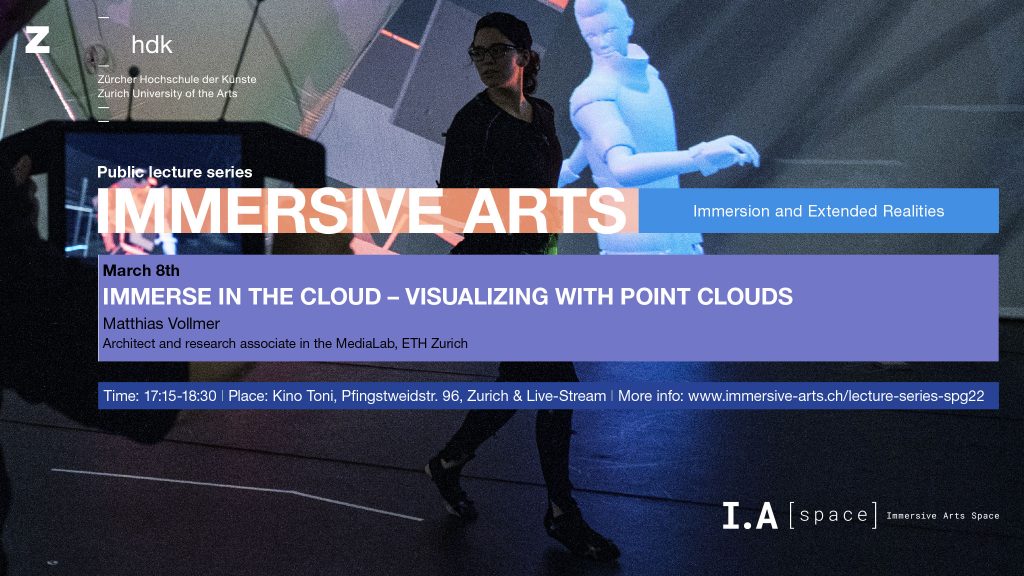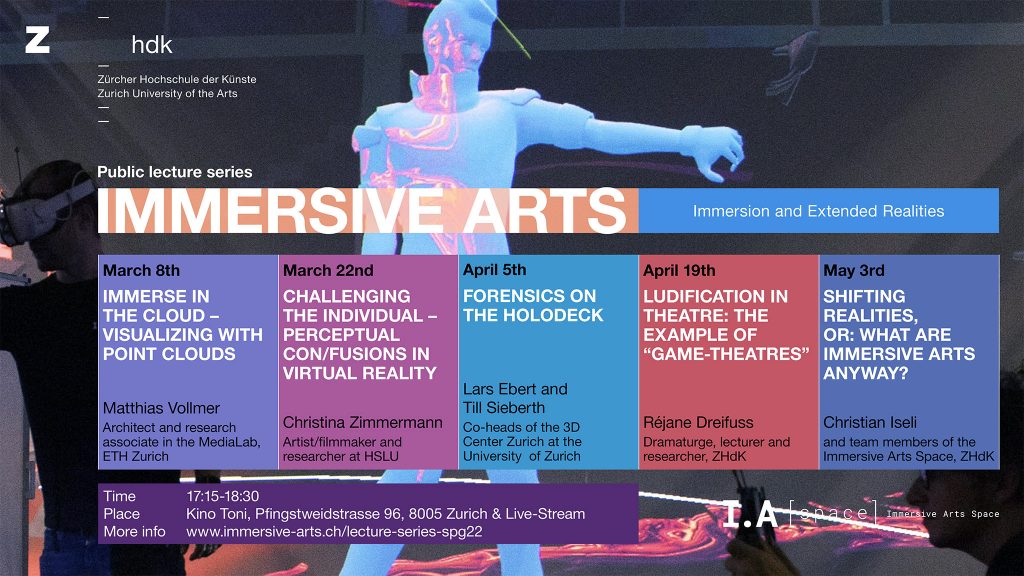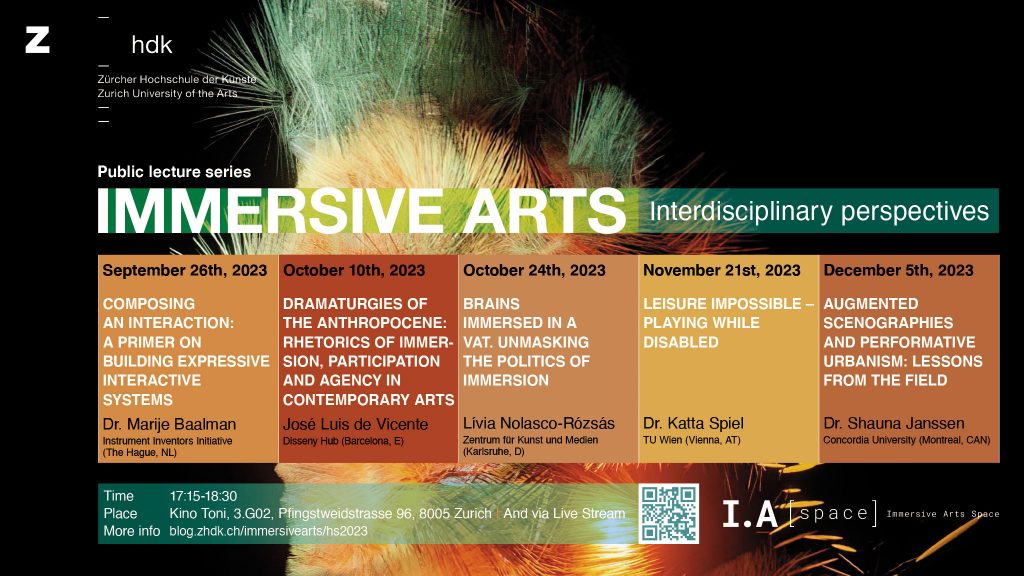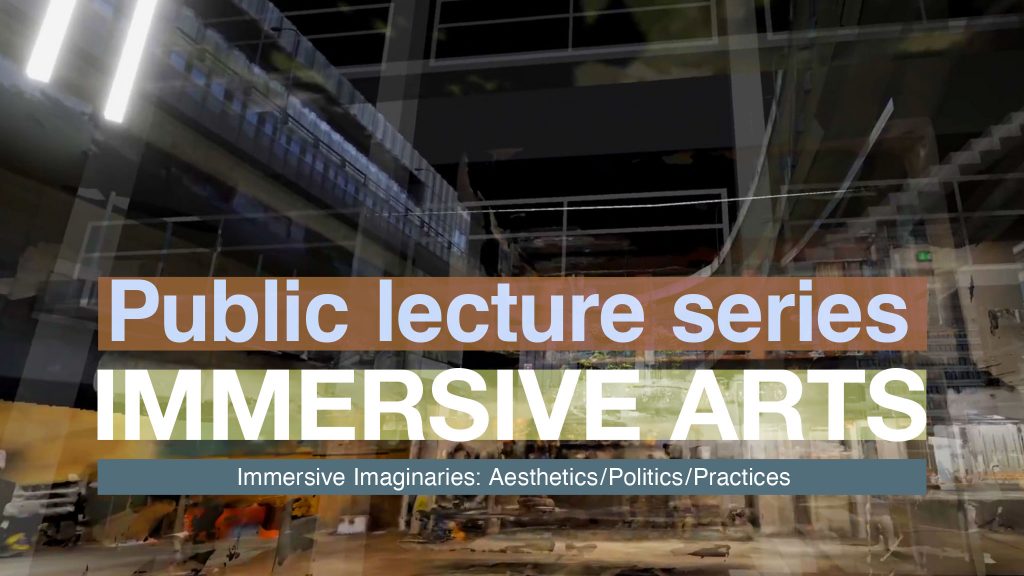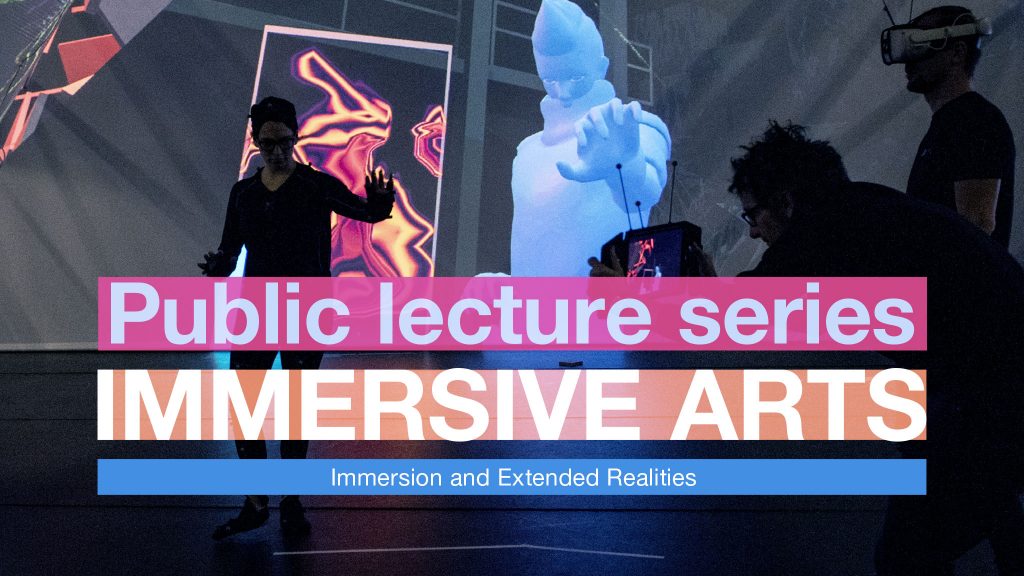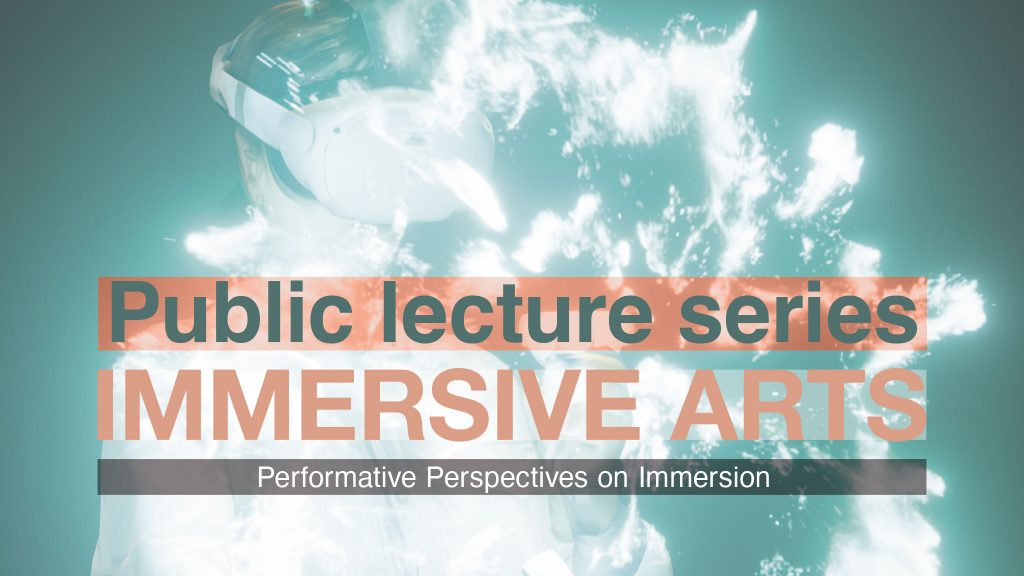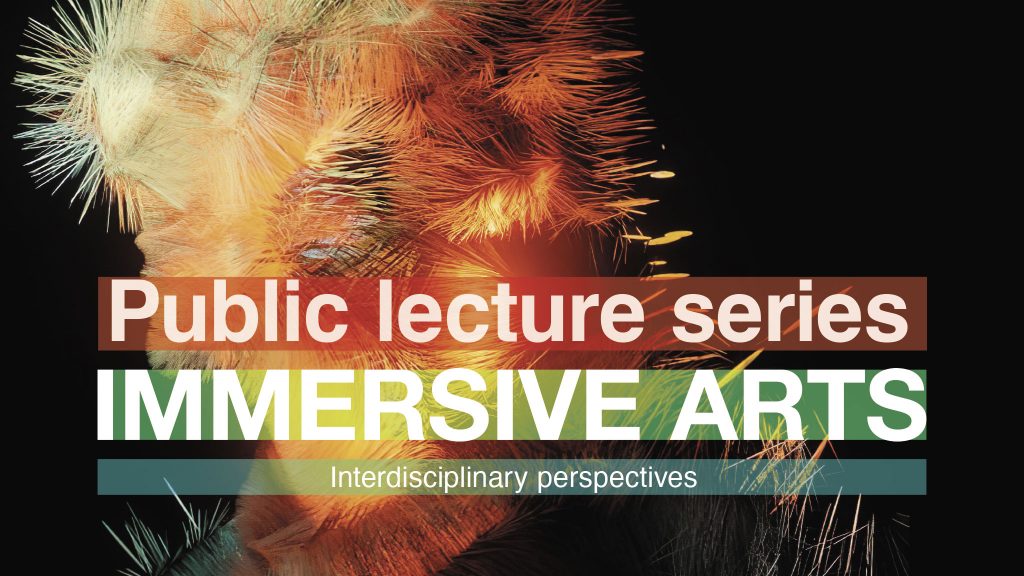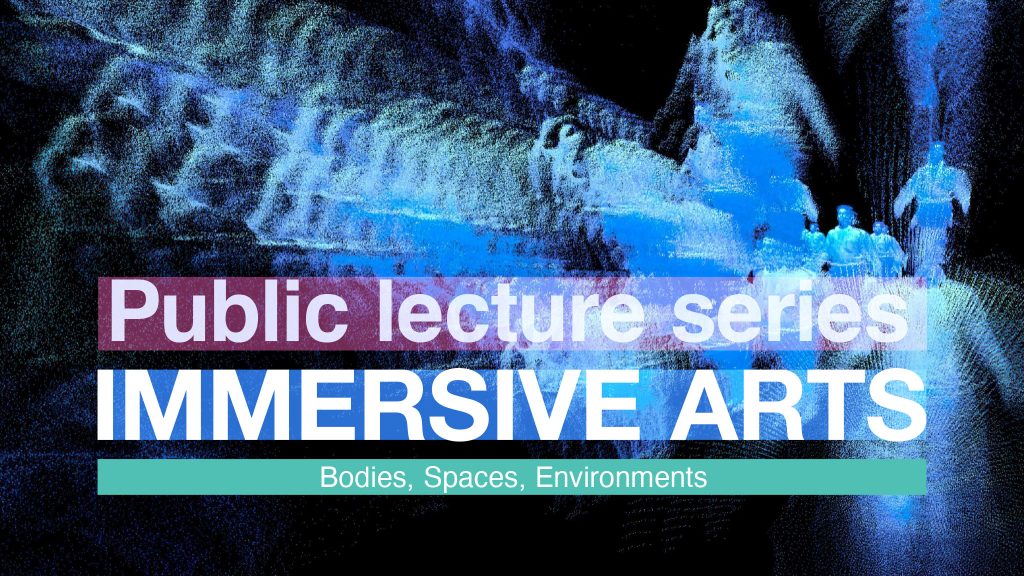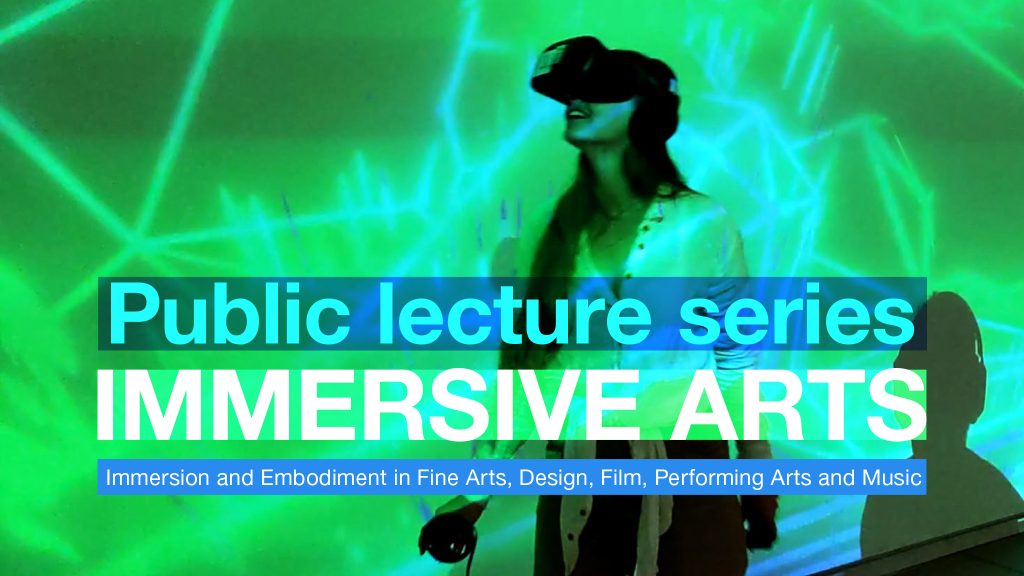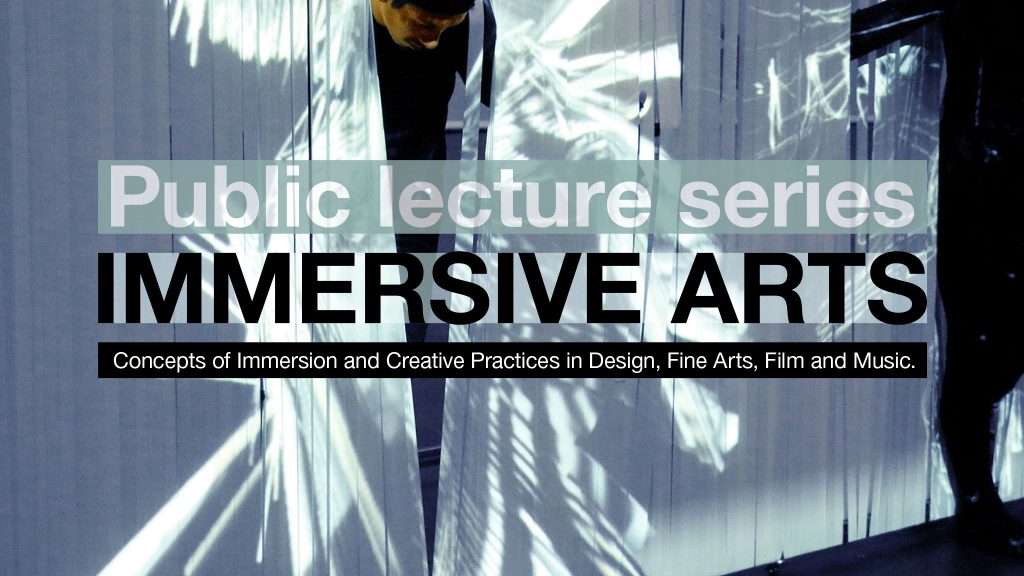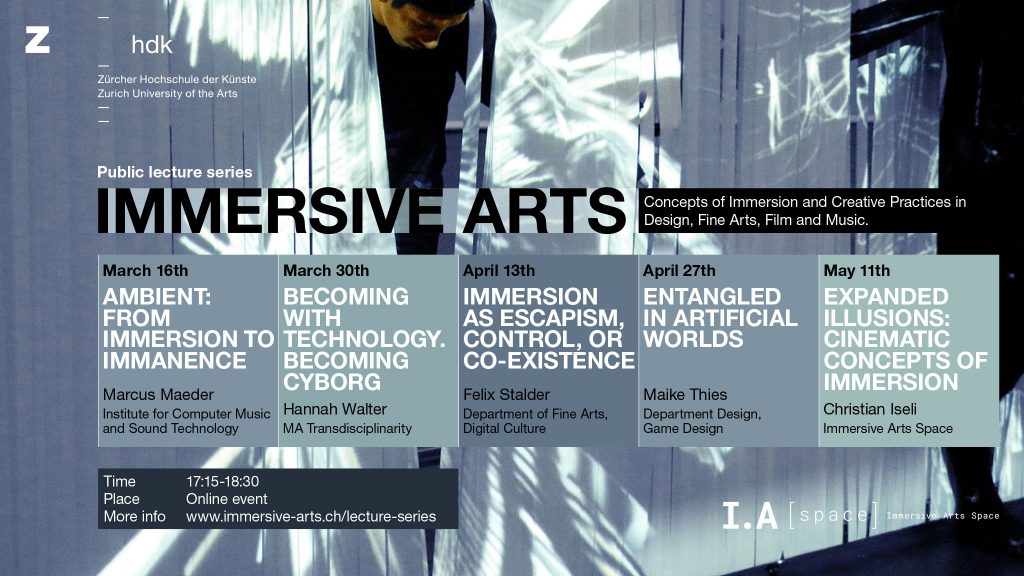
March 16th | Marcus Maeder 17:15- 18:30h
AMBIENT: FROM IMMERSION TO IMMANENCE
April 13th | Felix Stalder | 17:15- 18:30h
IMMERSION AS ESCAPISM, CONTROL, OR CO-EXISTENCE
April 27th | Maike Thies | 17:15- 18:30h
ENTANGLED IN ARTIFICIAL WORLDS
May 4th | Hannah Walter | 17:15-18:30h
BECOMING WITH TECHNOLOGY. BECOMING CYBORG
May 11th | Christian Iseli | 17:15-18:30h
EXPANDED ILLUSIONS: CINEMATIC CONCEPTS OF IMMERSION
AMBIENT: FROM IMMERSION TO IMMANENCE
Marcus Maeder, Institute for Computer Music and Sound Technology
Since its creation by the musician Brian Eno in 1976, the term ambient has undergone significant change. The musical style has developed into a framework of reception and terminology within which computer/digital music as well as visual art are conceived and received. The term ambient opens up a context of artistic and social practices reflecting a reality that is increasingly created by and transported via media technologies. Modern constructions of immanence are examined by using biologist Jakob von Uexküll’s concept of Umwelt, which he postulates as a world-generating context of body, cognition and environment. Accordingly, ambient can be understood as a sort of mimetic ceremony, producing extremely complex yet coherent images of the world. In the talk, a phenomenology of the sounds found in current digital music as well as associations and meanings elicited by them are presented.
Ambient is a compound of spaces in which a reflection of the world takes place, created through artistic, social, geographical and increasingly virtual devices. The idea of space as the expansion of thought, enclosing its infinite movements as an absolute horizon is implied by the concept of immanence proposed by Gilles Deleuze and Félix Guattari. In Ambient, a soundtrack of immanence is created, a polyphonic sound of the environment as we experience it, which makes the world in its diversity imaginable and possible to experience. In this, the possible, the utopian, is constitutive of immanence: Prototypically, experimentally and as a projection, it is created by the participants of a mimetic ceremony, of an ambient situation, by the artists and their audience.
Marcus Maeder is a sound artist, researcher and composer of electronic music. As an author, Maeder has written on a number of topics in the fields of sound art, artistic research and digital media. Maeder studied Fine Arts in Lucerne/Switzerland, Philosophy in Hagen/Germany and currently pursues his PhD in Environmental Systems Science at ETH Zurich. He runs the music label domizil, which he founded in 1996. Maeder has worked as an editor and producer for the Swiss radio station SRF and has been working as a researcher at the Institute for Computer Music and Sound Technology (ICST) of the Zurich University of the Arts ZHdK since 2005. On an invitation by French President François Hollande, Maeder presented his sound art installation/trees: Pinus sylvestris/at the 2015 United Nations Climate Change Conference COP21. In 2017 he presented his installation “Espirito da Floresta” at the Inter-American Development Bank in Washington DC – the same year in which he and Roman Zweifel received an honorable mention for ”treelab” at the STARTS Prize, which was offered by the European Commission at the Ars Electronica Festival in Linz/Austria.
IMMERSION AS ESCAPISM, CONTROL, OR CO-EXISTENCE
Felix Stalder, Department of Fine Arts, Digital Culture
Immersion is not necessarily a technical issue, but rather can be seen as a type of relation to the world. This relation – quite distinct from the “critical distance” championed by enlightenment thinkers – can have three different qualities: escapism, control, or co-existence. Escapism allows one to immerse oneself in an experience that is fully self-contained and aims to have no consequences beyond it. The ride on a rollercoaster would be an example of such an immersion. Control goes two ways: Either immersion allows an actor to control his/her environment to a much higher degree than it would be possible outside the immersion, or, the actor becomes subject to an unprecedented degree of control by those setting the parameters of the environment. Both types of control can, of course, co-exist at the same time, as they do in racing simulators. The third quality of immersive relationship enables the expression of a deeper relationship with an environment, in which the actors exist within a world that is so large and complex that no ‘outside’ view is possible. It expresses a condition of partial, situated experience and action, allowing the experience of mediated immersion to stand for existential co-existence with multiple others itself. Many immersive installations in contemporary art, for example, by Ilja Kabakov or Christoph Büchel, aim to produce this kind of quality.
These different qualities are not mutually exclusive. How all three of them shape the overall quality of the work is a question of the intention driving the design of the immersive situation.
Felix Stalder is professor for Digital Culture in the Department Fine Arts of the Zurich University of the Arts. His work focuses on the intersections of cultural, political and technological dynamics, in particular on commons, control society, copyright and transformation of subjectivity. He not only works as an academic but also as a cultural producer, being a moderator of the mailing list and a member of the World Information Institute as well as the Technopolitics Working Group (both in Vienna). Among his recent publications are «Digital Solidarity» (PML & Mute 2014) and «The Digital Condition» (Polity Press, 2018).
ENTANGLED IN ARTIFICIAL WORLDS
Maike Thies, Department of Design, Game Design
The constant presence of technology in our daily lives triggers our expectations and hunger for immersive experiences. Even established cultural institutions can no longer ignore the fundamental digital shift to stay relevant. Of course, this tendency is not without significant impact on Zurich University of the Arts’ curricula and the creative economy.
Science fiction literature, theatre, films, museums and games, in particular, have shaped our idea about immersion. While it seems that the desire for total immersion and a rush into virtual spheres is increasing on the user’s side, the quality and degree of the immersion cannot live up to the demand. It becomes apparent that an immersive experience cannot be created by technical know-how and state-of-the-art infrastructure alone.
The media artist Ed Atkins once said that “Immersion is not a warm bath”. In my lecture, I would like to follow this thought. By presenting a selection of international artists’ projects I want to highlight the way the arts and design can develop meaningful immersive experiences and call for more interdisciplinary cooperation.
Maike Thies is a research fellow in the field of game design at Zurich University of the Arts. Her research activities focus on interactive theatre, narrative spaces, immersive arts and speculative design. She is interested in the curation and development of interdisciplinary formats, dealing with the potential of digitization for arts and design. On behalf of the Bachelor Design, Maike curates and heads the interdisciplinary lecture series Kein Kino at the Toni Kino, focusing on “new realities and diverse futures”. She is also responsible for REFRESH, an interdisciplinary, international festival initiated by the department of design and the Immersive Arts Space. Maike is a member of Digitalrat ZHdK.
Further information about Maike’s research interests may be found at maikethies.com, refresh.zhdk.ch, and gamedesign.zhdk.ch.
BECOMING WITH TECHNOLOGY. BECOMING CYBORG
Hannah Walter, Department of Cultural Analysis, Transdisciplinary Studies
I coupled myself with a violin,
I charged myself with a battery,
I infused myself with electricity,
I incorporated a machine
ohm-i-am
wired-violin-skin
I become vyborg
We are a creature of reality
We are a creature of fiction
We are a porous corpus caring for capricious circuitry
We create us anew again and again
Here and There
We beam us up into a hole in space
we touch and we breath
we send and receive
we perceive
we repeat we delete
we bend we experiment
we listen we cite
we host we write
we improvise we fantasize
We present
… the practice-based PhD project “Becoming Vyborg. Sonic Cyborg Fictions in Sympoietic Telematic Systems“, which refers to notions of embodiment in relation to technologically mediated environments.
It approaches its research questions in the framework of the research group of the SNFS-funded project “Dis/continuities in Telematic Space” which focuses on spatial and bodily interactions between remote stages.
„By the late twentieth century, our time, a mythic time, we are all chimeras, theorized and fabricated hybrids of machine and organism; in short, we are cyborgs.“ (Haraway, Donna. 1991. “A Cyborg Manifesto”)
We investigate
… immersion through the figuration of the “cyborg”.
Hannah Walter is a violinist/violist. She is becoming a vyborg.
HannaH holds numerous scholarships and has won prizes at national and international competitions. She is a founding member and the artistic director of the transdisciplinary Collective Mycelium. In their productions they experiment with collective working processes and new concert formats.
Currently HannaH works as an academic assistant in the Master in Transdisciplinarity and as doctoral student in the SNFS-funded project “Dis/continuities in Telematic Space” and the Research Focus Transdisciplinarity of the Zurich University of the Arts.
EXPANDED ILLUSIONS: CINEMATIC CONCEPTS OF IMMERSION
Christian Iseli, Immersive Arts Space
Since the 1990s, the term immersion has been primarily used in connection with game theory, virtual reality and other technology-supported art forms. Yet it also refers to a long tradition in art history of creating illusions. As manufacturers of illusions and dreams, the producers of films have continually aimed to improve the immersive quality of cinema for their audiences.
Larger screens, stereoscopic 3D-images, surround sound and sensory experiences with shaking chairs or odors were commercially oriented but short lived extravagances of the analog era. Experimental filmmakers also sought to perfect the illusionist quality of their craft. Under the term Expanded Cinema, they fostered ideas of spatial narration and holographic representation. Later, digitalization brought along a whole range of innovations: the rebirth of stereoscopic 3D, higher frame rates, high dynamic range and 3D audio all fed into a new era, advertised as immersive cinema. In recent years, practically all international festivals have introduced sections for virtual or mixed reality experiences. Even though these emerging formats necessitate different ways of storytelling, they promise to bring Andre Bazin’s idea of ‘total cinema’ to reality.
Christian Iseli has been teaching and researching at the Zurich University of the Arts ZHdK since 1995. He holds a professorship for Immersive Arts, heads the Immersive Arts Space and teaches in the MA Film program. After studying history, German and English literature at the University of Bern, Iseli was a director of documentary films and worked in editing and cinematography on feature films and documentaries.
